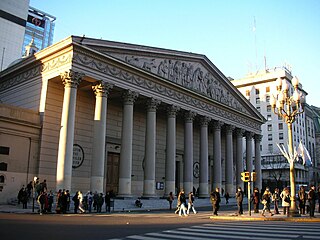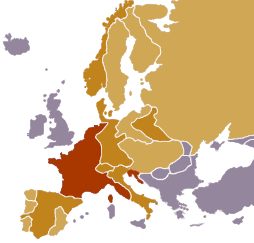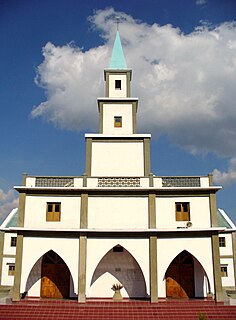Related Research Articles

A state religion is a religion or creed officially endorsed by a sovereign state. A state with an official religion, while not secular, is not necessarily a theocracy. State religions are official or government-sanctioned establishments of a religion, but the state does not need to be under the control of the religion nor is the state-sanctioned religion necessarily under the control of the state.

The Argentinian Catholic Church, or Catholic Church in Argentina, is part of the worldwide Catholic Church, under the spiritual leadership of the pope, the Curia in Rome, and the Argentine Episcopal Conference.

The Catholic Church in the Dominican Republic is part of the worldwide Catholic Church, under the spiritual leadership of the Pope in Rome.
Freedom of religion in Italy is guaranteed under the 1947 constitution of the Italian Republic. Before that religious toleration was provided for by the constitution of the Kingdom of Italy which in turn derived from the Albertine Statute granted by Carlo Alberto of the Kingdom of Sardinia to his subjects in 1848, the Year of Revolutions.

Christianity is the most widely professed religion in the Dominican Republic. Historically, Catholicism dominated the religious practices of the country, and as the official religion of the state it receives financial support from the government. In modern times Protestant and non-Christian groups, such as Muslims and Jews, have experienced a population boom.

The Organic Articles was a law administering public worship in France.

Christianity remains strong and vital for the life of Guatemalan society, but its composition has changed considerably in recent decades.
The Indonesian constitution provides some degree of freedom of religion. The government generally respects religious freedom for the six officially recognized religions and/or folks religion. All religions have equal rights before the law. However, the government keeps blocking thousands of houses of worship under such a discriminatory law.
The Constitution provides for freedom of religion and creeds and the exercise of all religious rites provided that the public order is not disturbed. The Constitution declares equality of rights and duties for all citizens without discrimination or preference but establishes a balance of power among the major religious groups. The Government generally respected these rights; however restricted the constitutional provision for apportioning political offices according to religious affiliation since the National Pact agreement. There were periodic reports of tension between religious groups, attributable to competition for political power, and citizens continued to struggle with the legacy of the civil war that was fought along sectarian lines. Despite sectarian tensions caused by the competition for political power, Lebanese continued to coexist.
The Constitution provides for freedom of religion; however, the Government restricted this right in practice.
The Constitution provides for freedom of religion, and the Government generally respected these rights in practice.

The majority of the population of East Timor is Christian, and the Catholic Church is the dominant religious institution, although it is not formally the state religion. There are also small Protestant and Sunni Muslim communities.
In Nauru, the Nauru Congregational Church is the largest religion, encompassing 35.71% of the population as of the 2011 census. Freedom of religion is a constitutional right, and the country's laws and society uphold this right without any significant breaches.

The most widely professed religion in Croatia is Christianity and a large majority of the Croatian population declare themselves to be members of the Catholic Church. Croatia has no official religion and Freedom of religion is a right defined by the Constitution of Croatia, which also defines all religious communities as equal in front of the law and separate from the state.
Christianity is the predominant religion in Honduras, representing 76% of the total population according to a 2017 estimate. The pre-Hispanic peoples that lived in actual Honduras were primarily polytheistic Maya and other native groups. In the 16th century, Roman Catholicism was introduced by the Spanish Empire. Another popular religion in Honduras is the Protestant religion, with 41% claimed to be in the Protestant religion.
The status of religious freedom in Africa varies from country to country. States can differ based on whether or not they guarantee equal treatment under law for followers of different religions, whether they establish a state religion, the extent to which religious organizations operating within the country are policed, and the extent to which religious law is used as a basis for the country's legal code.
The status of religious freedom in Europe varies from country to country. States can differ based on whether or not they guarantee equal treatment under law for followers of different religions, whether they establish a state religion, the extent to which religious organizations operating within the country are policed, and the extent to which religious law is used as a basis for the country's legal code.
The status of religious freedom in North America varies from country to country. States can differ based on whether or not they guarantee equal treatment under law for followers of different religions, whether they establish a state religion, the extent to which religious organizations operating within the country are policed, and the extent to which religious law is used as a basis for the country's legal code.
The status of religious freedom in South America varies from country to country. States can differ based on whether or not they guarantee equal treatment under law for followers of different religions, whether they establish a state religion, the extent to which religious organizations operating within the country are policed, and the extent to which religious law is used as a basis for the country's legal code.

Human rights in the Dominican Republic constitute the civil and political rights and freedoms legally protected under the Constitution of the Dominican Republic and enforced by the government through common and statutory law. The majority of human rights disputes are presided over by the highest court of constitutional appeal, the Dominican Constitutional Tribunal. These rights and freedoms have developed over time in accordance with the Dominican Republic's expansion from the former Spanish colony of the Captaincy General of Santo Domingo to its modern state formation. The history of human rights in the state have also been marked by the oscillation between democratic administrations, such as the current presidency of Danilo Medina, and authoritarian administrations, most significantly the dictatorial regime of Rafael Trujillo between 16 August 1930 and 16 August 1938. As a member of the Organization of American States and the United Nations, the Dominican Republic is party to myriad legal treaties and covenants which propagate the human rights standards of the international community and have integrated the majority of these human rights directives into their domestic legislation.
References
- ↑ International Religious Freedom Report 2005: Dominican Republic. Bureau of Democracy, Human Rights, and Labor, U.S. Department of State. Retrieved 17 January 2007.
- ↑ Dominican Catholic, Protestant churches spat over marriages Archived 2009-06-15 at the Wayback Machine
- 1 2 Wilson, Lamar C. and Patricia Kluck (1989). "Religion". Chapter 2 - Dominican Republic: The Society and Its Environment. In A Country Study: Dominican Republic. Library of Congress (Call Number F1934.D64 2001). Retrieved 17 January 2007.